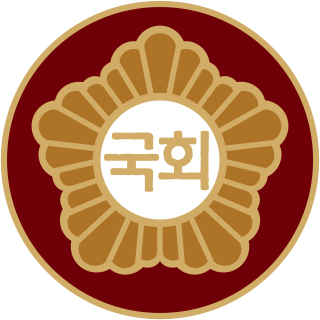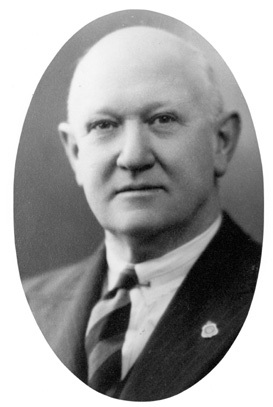
The Democratic Labor Party was a progressive and nationalist political party in South Korea. It was founded in January 2000, in the effort to create a political wing for the Korean Confederation of Trade Unions which was considered more left-wing and more independent of the two union federations in South Korea. Its party president was Kwon Young-gil, Kang Gi-gap, and Lee Jung-hee. In December 2011, the party merged into the Unified Progressive Party.

The National Assembly of the Republic of Korea is the unicameral national legislature of South Korea. Elections to the National Assembly are held every four years. The latest legislative elections were held on 10 April 2024. The current National Assembly held its first meeting, and also began its current four year term, on 30 May 2024. The next Speaker was elected 5 June 2024. The National Assembly has 300 seats, with 253 constituency seats and 47 proportional representation seats; 30 of the PR seats are assigned an additional member system, while 17 PR seats use the parallel voting method.

Mid Ulster is a parliamentary constituency in the UK House of Commons. The current MP is Cathal Mallaghan, of Sinn Féin, who was first elected at the 2024 election.

Fermanagh and South Tyrone is a Northern Ireland parliamentary constituency in the British House of Commons. It is currently represented by Pat Cullen of Sinn Féin.

The First Republic of Korea was the government of South Korea from August 1948 to April 1960. The first republic was founded on 15 August 1948 after the transfer from the United States Army Military Government that governed South Korea since the end of Japanese rule in 1945, becoming the first independent republican government in Korea. Syngman Rhee became the first president of South Korea following the May 1948 general election, and the National Assembly in Seoul promulgated South Korea's first constitution in July, establishing a presidential system of government.
The Korea Democratic Party was the leading opposition party in the first years of the First Republic of Korea. It existed from 1945 to 1949, when it merged with other opposition parties.

General elections were held in South Africa on 15 April 1953. The elections consolidated the position of the National Party under D. F. Malan, which won an absolute majority of the 156 elected seats in the House of Assembly, also receiving the most votes. Its first-time majority of the white electorate would be retained until the 1989 elections.

Legislative elections were held in South Korea on April 9, 2008. The conservative Grand National Party won 153 of 299 seats while the main opposition United Democratic Party won 81 seats. This election marked the lowest-ever voter turnout of 46%.

Legislative elections were held in South Korea on 13 April 2000.

Elections were held in the state of Western Australia on 15 March 1947 to elect all 50 members to the Legislative Assembly. The result was a hung parliament—the four-term Labor government, led by Premier Frank Wise, was defeated with a swing of approximately 7%. The Liberal-Country Coalition won exactly half of the seats, one short of a majority, needed the support of the Independent members Harry Shearn and William Read to govern.
Indirect presidential elections were held in South Korea on 12 August 1960, which saw the election of Yun Posun as President of the Republic of Korea, a ceremonial political position in the Second Republic. Held after the April Revolution which had forced the resignation of Syngman Rhee, it was the only presidential election to be held during the short era of the Second Republic, as the Republic folded after Park Chung-hee's May Coup the next year. The election was indirect, with a joint session of the House of Commons and Senate, which had been elected in July, acting as the electors. The winning candidate required the assent of two thirds of the members of both houses.

Early presidential elections were held in South Korea on 9 May 2017 following the impeachment and removal of Park Geun-hye. The elections were conducted in a single round, on a first-past-the-post basis, and had originally been scheduled for 20 December 2017. However, they were brought forward after the decision of the Constitutional Court on 10 March 2017 to uphold the National Assembly's impeachment of Park. Following procedures set out in the Constitution of South Korea, Prime Minister Hwang Kyo-ahn succeeded Park as the acting president. After Park was removed from office by the Constitutional Court's ruling, acting president Hwang announced he would not run for a term in his own right.

Legislative elections were held in South Korea on 13 April 2016. All 300 members of the National Assembly were elected, 253 from first-past-the-post constituencies and 47 from proportional party lists. The election was an upset victory for the liberal Democratic Party, which defied opinion polling by winning a plurality of seats in the election and defeating the ruling conservative Saenuri Party by one seat. In votes for party lists, however, Democratic Party came third, behind the Saenuri Party in first place and the new People Party in second.

The 1929 Victorian state election was held in the Australian state of Victoria on Saturday 30 November 1929 to elect the 65 members of the state's Legislative Assembly.
The National Association was a political party in South Korea.
The Democratic Nationalist Party was a conservative political party in South Korea.
The Korea Nationalist Party was a political party in South Korea.

Legislative elections were held in South Korea on 15 April 2020. All 300 members of the National Assembly were elected, 253 from first-past-the-post constituencies and 47 from proportional party lists. They were the first elections held under a new electoral system. The two largest parties, the liberal Democratic Party and the conservative United Future Party, set up new satellite parties to take advantage of the revised electoral system. The reforms also lowered the voting age from 19 to 18.

Legislative elections in South Korea determine the composition of the National Assembly for the next four years.















